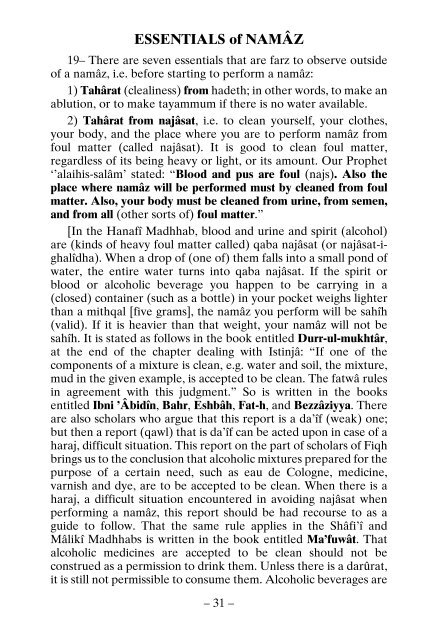O Son !
THE BOOK ‘O SON’ Al-hamdu lillâhi Rabbil ’âlamîn. Wa-s-salâtu wa-s-salâmu ’alâ Rasûlinâ Muhammadin wa Âlihi wa Sahbihi ajma’în. 1– O son! Collecting from books written by the scholars of the Hanafî Madhhab three hundred and sixty hadîth-i-sherîfs and forty-four khabars and also the seven essentials and the five rukns and the seven wâjibs and the fourteen sunnats and the twenty-five mustahabs and the fourteen mufsids of namâz, I have explained them for you. Adapt your acts and deeds to these teachings so that you attain fayz and nejât (salvation)! 2– Also for your information, I have collected a thousand and ninety âdâb (adabs) for you and for other young Muslims like you. If you adapt your actions and acts of worship to these teachings, they will be sufficient for you. If you laze, disobey Allâhu ta’âlâ and cease from these practices and manners, you will be afflicted with slavery and disgrace in the world and subjected to torment in the world to come. If you live up to them and advise your Muslim brothers to do the same, it will be useful for you. They will say blessings over you. And Haqq ta’âlâ will accept their invocations. For, a slave will be pardoned on account of another slave’s invocations for them.
THE BOOK ‘O SON’
Al-hamdu lillâhi Rabbil ’âlamîn. Wa-s-salâtu wa-s-salâmu ’alâ
Rasûlinâ Muhammadin wa Âlihi wa Sahbihi ajma’în.
1– O son! Collecting from books written by the scholars of the
Hanafî Madhhab three hundred and sixty hadîth-i-sherîfs and
forty-four khabars and also the seven essentials and the five rukns
and the seven wâjibs and the fourteen sunnats and the twenty-five
mustahabs and the fourteen mufsids of namâz, I have explained
them for you. Adapt your acts and deeds to these teachings so that
you attain fayz and nejât (salvation)!
2– Also for your information, I have collected a thousand and
ninety âdâb (adabs) for you and for other young Muslims like you.
If you adapt your actions and acts of worship to these teachings,
they will be sufficient for you. If you laze, disobey Allâhu ta’âlâ
and cease from these practices and manners, you will be afflicted
with slavery and disgrace in the world and subjected to torment in
the world to come.
If you live up to them and advise your Muslim brothers to do
the same, it will be useful for you. They will say blessings over you.
And Haqq ta’âlâ will accept their invocations. For, a slave will be
pardoned on account of another slave’s invocations for them.
Create successful ePaper yourself
Turn your PDF publications into a flip-book with our unique Google optimized e-Paper software.
ESSENTIALS of NAMÂZ<br />
19– There are seven essentials that are farz to observe outside<br />
of a namâz, i.e. before starting to perform a namâz:<br />
1) Tahârat (clealiness) from hadeth; in other words, to make an<br />
ablution, or to make tayammum if there is no water available.<br />
2) Tahârat from najâsat, i.e. to clean yourself, your clothes,<br />
your body, and the place where you are to perform namâz from<br />
foul matter (called najâsat). It is good to clean foul matter,<br />
regardless of its being heavy or light, or its amount. Our Prophet<br />
‘’alaihis-salâm’ stated: “Blood and pus are foul (najs). Also the<br />
place where namâz will be performed must by cleaned from foul<br />
matter. Also, your body must be cleaned from urine, from semen,<br />
and from all (other sorts of) foul matter.”<br />
[In the Hanafî Madhhab, blood and urine and spirit (alcohol)<br />
are (kinds of heavy foul matter called) qaba najâsat (or najâsat-ighalîdha).<br />
When a drop of (one of) them falls into a small pond of<br />
water, the entire water turns into qaba najâsat. If the spirit or<br />
blood or alcoholic beverage you happen to be carrying in a<br />
(closed) container (such as a bottle) in your pocket weighs lighter<br />
than a mithqal [five grams], the namâz you perform will be sahîh<br />
(valid). If it is heavier than that weight, your namâz will not be<br />
sahîh. It is stated as follows in the book entitled Durr-ul-mukhtâr,<br />
at the end of the chapter dealing with Istinjâ: “If one of the<br />
components of a mixture is clean, e.g. water and soil, the mixture,<br />
mud in the given example, is accepted to be clean. The fatwâ rules<br />
in agreement with this judgment.” So is written in the books<br />
entitled Ibni ’Âbidîn, Bahr, Eshbâh, Fat-h, and Bezzâziyya. There<br />
are also scholars who argue that this report is a da’îf (weak) one;<br />
but then a report (qawl) that is da’îf can be acted upon in case of a<br />
haraj, difficult situation. This report on the part of scholars of Fiqh<br />
brings us to the conclusion that alcoholic mixtures prepared for the<br />
purpose of a certain need, such as eau de Cologne, medicine,<br />
varnish and dye, are to be accepted to be clean. When there is a<br />
haraj, a difficult situation encountered in avoiding najâsat when<br />
performing a namâz, this report should be had recourse to as a<br />
guide to follow. That the same rule applies in the Shâfi’î and<br />
Mâlikî Madhhabs is written in the book entitled Ma’fuwât. That<br />
alcoholic medicines are accepted to be clean should not be<br />
construed as a permission to drink them. Unless there is a darûrat,<br />
it is still not permissible to consume them. Alcoholic beverages are<br />
– 31 –

















